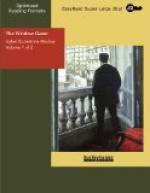“No. Though it might be rather a good idea, don’t you think? If, as you say, there is a course of reading, it would be sufficiently literary, I suppose? At present we are taking up psycho-analysis— dreams, you know. It was not my choice. As a subject for club study I consider it too modern. Besides, I seldom dream. And when I do, my dreams are not remarkable. However, it seems that all dreams are remarkable. And I admit that there may be something in it. Take, for instance, a dream which I had the other night. I dreamed that I was endeavoring to do my hair and every time I put my hand on a hairpin that horrible parrot of yours snapped it up and swallowed it. Now, according to psycho-analysis, that dream has a meaning. Understood rightly it discloses that I have, in my waking moments, a repressed feeling of intense dislike for that hateful bird. And it is quite true. I have. So you can see how useful that kind of thing might be in getting at the truth in cases of murder. I hope,” turning to Desire, “I hope I am not being too scientific for you, my dear? When the ladies feel that they know you better you may perhaps join our club, if you care for anything so serious? May I give you more tea?”
“Thanks, yes. That would be delightful.”
“Not so delightful, my dear, as educative. But as I was saying, Benis, it is all your fault that this misconception has got about. I blame you very much in the matter. It comes naturally from your writing so continually about Indians and foreigners and Primitives generally. People come to associate you with them. Still, I think it was extremely rude of Mrs. Stopford Brown to say it.”
“So do I,” said Spence, with conviction.
“I asked Mrs. Everett, who told me, if anyone else had made remarks leading up to it. But she says not a word. It was just that Mrs. Everett said that it was strange that when you had taken so long to consider marriage you should have made up your mind so quickly in the end—’Gone off like a sky-rocket!’ was her exact wording, and Mrs. Stopford Brown said, in that frivolous way she has, ’Oh, I suppose he stumbled across a Primitive.’ You will notice, Desire, that Mrs. Stopford Brown’s name is not upon the list for your reception.”
“But—” began Desire, controlling her face with difficulty.
“No ‘buts,’ my dear. It may seem severe, but Mrs. Stopford Brown is quite too careless in her general conversation. It is true that her remark is directly traceable to my nephew’s unfortunate writings, but she should have investigated her facts before speaking. The result is that it is all over town that you have Indian blood. They say that, out there, almost everyone married squaws once and that is why there is no dower law in British Columbia. Those selfish people did not wish their Indian wives to wear the family jewels. Benis! You will break that cup if you balance it so carelessly. What I want to know is, what are you going to do about it?”




